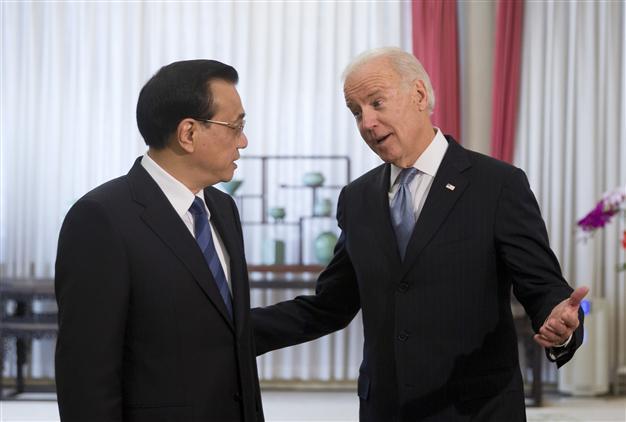Biden says 'significant apprehension' over China air zone
BEIJING - Agence France-Presse

Vice President Joe Biden, right, chats with Chinese Premier Li Keqiang before their meeting at the Zhongnanhai leadership compound in Beijing, China Thursday, Dec. 5, 2013. AP Photo
US Vice President Joe Biden said on Thursday that China must take steps to reduce tensions in the Asia-Pacific to protect its growing stake in regional peace and stability.
Biden, speaking to about 60 US business leaders in China, expressed alarm over the country's move to expand military influence in the skies over the East China Sea, and said he discussed the issue during more than four hours of talks with Chinese President Xi Jinping.
"China's recent and sudden announcement of the establishment of a new air defence identification zone has, to state the obvious, caused significant apprehension in the region," Biden said.
"And I was very direct about our firm position and our expectations in my conversations with President Xi." China declared last month that it had established an "air defence identification zone", or ADIZ, over an area off its southeast coast that includes a group of islands disputed with Japan.
The move provoked anger in the region and prompted the US to defy Beijing by flying two B-52 bombers into the newly-declared zone.
Biden's remark came on the final day of his two-day visit to Beijing.
The issue has dominated the agenda of Biden's trip, which took him to Tokyo earlier this week and was due to carry on in Seoul later Thursday.
A senior White House official, speaking with reporters in Beijing late Wednesday at the end of the leaders' day of meetings, reiterated that the US does not recognise China's move but suggested that it was key Beijing did not take any actions connected to the zone that would escalate tensions in the region.
"We also made clear that not just the United States, but other countries as well are looking at them to take steps to lower tensions, and that includes avoiding enforcement actions that really could lead to a crisis," said the official, who requested anonymity in order discuss the details of the talks.
China emphasised through its state-run media on Thursday that it sees Tokyo as the aggressor in the dispute, which the Global Times newspaper argued in an editorial has been "stirred up by Japan to win pity". "Japan deliberately created a crisis and tried to get the US involved, hoping the US and China will evolve into confrontation," the newspaper wrote. It added that "it would be a nightmare" if the US and China were to "actively confront each other".
Despite the heightened nationalistic feelings and heated rhetoric surrounding the issue -- which hinges on a decades-old dispute over the island group, which Beijing calls Diaoyu and Tokyo, which controls them, calls Senkaku -- experts say that any outbreak of violence remains unlikely, as the major trade relationship between the two Asian powers is a strong incentive for both sides to avoid conflict.
In his remarks Thursday morning, Biden described a "complex" US-China relationship and acknowledged that "we have our differences and they are real".
"But there's nothing inevitable about a conflict with China -- nothing inevitable about a conflict with China," he added. "Wholesome competition and strong competition is fundamentally different than conflict."
